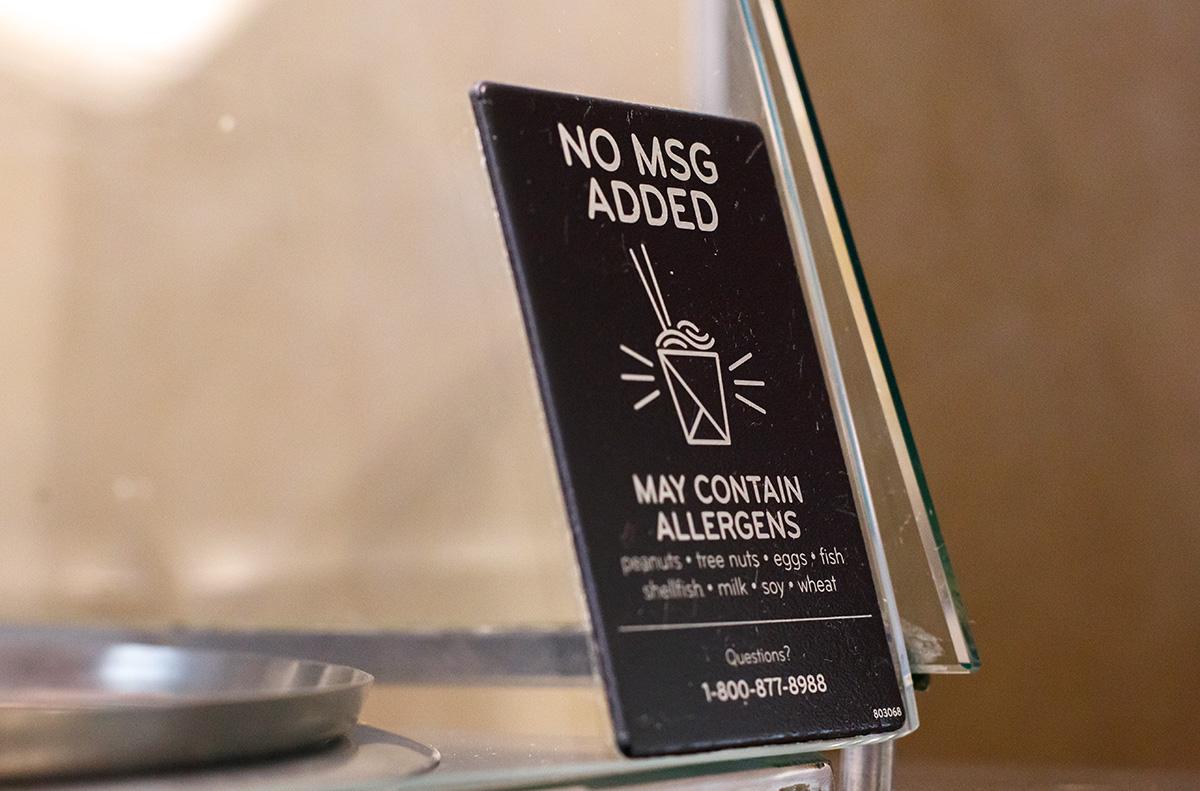The Quad: Misconceptions about MSG negatively impact Asian American communities
The Quad explores the history behind “Chinese restaurant syndrome” and how it has created an unhealthy narrative surrounding Chinese food. (Joseph Jimenez/Assistant Photo editor)
By Ashley Leung
July 25, 2022 5:20 p.m.
According to the New York Times, by the end of the 1960s, an influx of Asian immigrants to the United States allowed enclave communities, many of which depended on family-run restaurants, to flourish.
However, public commotion in the 1960s over one particular ingredient, MSG, increasingly plagued these eateries and exacerbated xenophobic estrangement of Asian communities, according to CNN.
MSG, also known as monosodium glutamate, was discovered in 1908 by Japanese chemist Kikunae Ikeda, founder of the seasoning company Ajinomoto, and it has since been branded as an umami seasoning and food enhancer. It is derived from an amino acid naturally found in foods such as seaweed, cheese, mushrooms and tomatoes.
MSG became steadily used in restaurants lined along the non-residential streets of Chinatown, Little Tokyo, Historic Filipinotown, Koreatown and more.
In 1968, the New England Journal of Medicine published a letter speculating that harmful symptoms such as palpitations and dizziness – termed “Chinese restaurant syndrome” – could be a result of consuming MSG. Although the letter included other potential culprits such as soy sauce and sodium, some consumers were quick to blame MSG.
The Federal and Drug Administration, however, has recognized MSG as generally safe. Additionally, the Federation of American Societies for Experimental Biology reported that mild symptoms such as headache and palpitations usually only occur for sensitive individuals who ingest more than six times the normal amount of MSG on an empty stomach.
Benjamin Woo, an Asian American studies and psychiatry and biobehavioral sciences professor, said when he first came to the U.S. in the 1990s, he met several chefs at church who had lost their restaurant businesses in the 1980s because of Chinese restaurant syndrome.
“Meeting those once upon a time chefs, it was upsetting to see how their morals were being destroyed because they were trying to cook relatively healthy, normal food — no different from any other culture,” Woo said.
Even now, Chinese food is oftentimes generalized as unhealthy. In 2019, a white woman attempted to open a restaurant serving what she described as “clean” Chinese food that wouldn’t make people feel “bloated and icky,” according to CNN.
These stigmas may be rooted in historical inequity.
Jean-Paul deGuzman, an Asian American studies lecturer, said as a result of de facto segregation laws and anti-Asian racism confining Asian immigrants within undesirable parts of American cities, Asian restaurants were under-resourced and lacked proper sanitation services.
“We take that, combined with just culinary practices that are so different from the mainstream European/American norm, … to paint Chinese restaurants as uniquely foreign, uniquely dangerous, uniquely dirty,” deGuzman said.
Anti-Chinese movements emerging in the 1870s destroyed many rural Chinatowns in the U.S. and pushed Chinese immigrants to urban areas, according to NBC. Additionally, these urban Chinatowns became segregated and concentrated because of anti-Chinese racism, perpetuated by the Chinese Exclusion Act of 1882, according to NBC.
Now, Asian American activists are combating the racism behind Chinese restaurant syndrome. In 2020, the #RedefineCRS campaign headed by Ajinomoto, a Japanese food and biotechnology corporation, successfully pushed for Merriam Webster’s redefinition of Chinese restaurant syndrome as a “dated, sometimes offensive” term.
Asian American celebrities, including chef Eddie Huang, comedian Uncle Roger and television host Jeannie Mai Jenkins, have also worked to erase stigmas attached to MSG through campaigns and YouTube videos.
However, amid COVID-19 and the rise of gentrification in the U.S., many of Chinatown’s oldest restaurants are now nowhere to be seen, according to the Washington Post.
Aversion toward and misunderstanding of Chinese eating habits and hygiene practices have, according to CNN, contributed to almost half of Chinese restaurants ceasing operation during the pandemic, rendering LA’s Chinatown nearly deserted.
To protect these spaces — restaurants and beyond — we can reassess the purpose and value of ethnic enclaves, communal spaces that can empower vulnerable populations, especially for those who possess linguistic and cultural differences.
Chinatown is not just a symbol of community heritage but also a space for immigrants to financially support themselves, said Min Zhou, an Asian American studies and sociology professor at UCLA.
In the fight against LA Chinatown’s gentrification, refugees from Cambodia and Vietnam and immigrants from Thailand who reside in Chinatown have also started petitions to raise awareness.
But as close-knit as these communities are, ethnic enclaves can also become easy targets during heights of racial and ethnic tensions, as seen in the MSG and COVID-19-induced scares and the racially motivated burning of Santa Ana’s Chinatown in 1906, according to the LA Times.
Both racial solidarity and understanding of the unique positions within the racial hierarchy are important, deGuzman said.
“It’s important for young Asian American activists to acknowledge our own privilege to understand and access what are our motivations for engaging in cross-solidarity work,” deGuzman said.
For now, Bruins can take advantage of their diverse campus community to spread awareness of shared and unique struggles within ethnic and racial communities.
Furthermore, the #RedefineCRS campaign website lists several recipes that are enhanced by MSG. Different culinary practices being increasingly normalized is a sign of affirmation for the restaurants that once had to depend on “No-MSG” signs to survive.
